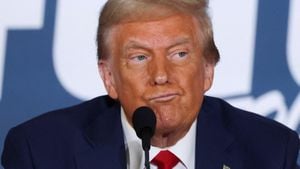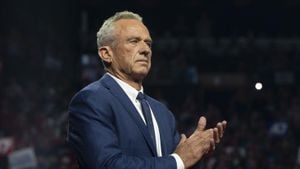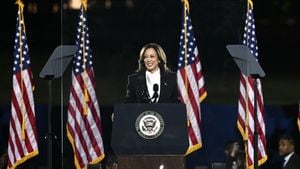The debate surrounding vaccinations has taken center stage again as former presidential candidate Robert F. Kennedy Jr., who recently endorsed Donald Trump for the presidency, calls for federal data on vaccine safety. This request has stirred considerable attention, especially after comments made by Howard Lutnick, co-chair of Trump's transition team for 2024, during his recent appearance on CNN.
Lutnick revealed on the show, hosted by Kaitlan Collins, what he characterized as Kennedy’s goal: to gather government data to demonstrate vaccines' unsafety. According to Lutnick, Kennedy believes this information could lead to crippling the legal protections currently extending to vaccine manufacturers, which he believes would compel companies to withdraw their products from the market. "He says, ‘If you give me the data, all I want is the data, and I’ll take on the data and show it’s not safe,’" Lutnick explained during the interview.
This assertion, echoed at rallies and online platforms, connects Kennedy with various conspiracy theories previously circulated about vaccines, including historically discredited allegations linking vaccines to autism. Lutnick mentioned theories discussed during his lengthy conversation with Kennedy, making headlines for echoing sentiments often espoused by anti-vaccine activists. He noted, “I think it’ll be pretty cool to give him the data. Let’s see what he’s come up with. I think it’s pretty fun.”
But therein lies the crux of the matter: vaccinations remain one of the most rigorously studied areas of public health. Millions of doses administered to populations around the world have demonstrated both safety and efficacy, according to decades of scientific data. Scientific authorities consistently affirm the importance of vaccines - not just for individual health, but for public health at large. Following Lutnick's statements, many experts and advocates have responded with serious concern over the potential ramifications such attitudes could have on public trust and health outcomes if they were allowed to take root within governance structures.
Kennedy, who has gained notoriety for his controversial views on vaccines, had claimed earlier this week during public speaking events and interviews, the Trump administration promised him oversee of health agencies if Trump secures the presidency. He suggested Trump had extended to him control over the Department of Health and Human Services (HHS) among other health agencies. Lutnick countered this narrative immediately, stating, "He’s not getting a job for HHS." Yet, the damage was done, and the mere suggestion of his involvement has alarmed health authorities.
This episode also unveils broader concerns among public health experts. With the rise of vaccine hesitancy exacerbated by misinformation, such endorsements carry weight and inspire trepidation among scientists and health officials alike who fear for the public's wellbeing. Following Lutnick's remarks, various scientific and medical communities have reiterated the importance of vaccine transparency, urging the public not to be swayed by misinformed theories purported by individuals such as Kennedy.
Vaccination protections stem from rigorous research affirming their efficacy against diseases, and data driven by public health authorities indicate declining incidences of previously rampant illnesses due to widespread vaccination programs. The concern among critics is the echoes of Kennedy’s theories could lead to backpedaling progress, especially as the public continues to grapple with the lasting impact of the COVID-19 pandemic.
Interestingly, Lutnick's statements haven’t gone unnoticed. They have sparked debates not only among politicians but also within the broader media spectrum. Disparate reactions from media outlets reflect the divisiveness of the issue; outlets aligned with varying political ideologies have approached the news through different lenses. Initially supportive of Trump, they now confront the reality of his association with anti-vaccine rhetoric.
Data on vaccine safety is overwhelmingly published by peer-reviewed journals, providing ample counter-evidence to the claims made by Kennedy and supported by Lutnick. Autism prevalence, which has frequently been misattributed to vaccinations, has grown alongside broader recognition and wider diagnostic criteria rather than as consequences of vaccinations. Notably, many hypotheses, including genetic factors and environmental influences, serve as the backdrop for the increased rates of diagnosis.
Yet, for those strictly adhering to the anti-vaccine narrative, these reassurances may not suffice. Lutnick's endorsement of Kennedy's ideas provides them with not just validation, but momentum, as they sculpt narratives surrounding distrust of vaccines from authoritative sources. The potential for injecting bureaucracy with individuals who question public health measures raises alarms among those who prioritize the well-being of the public.
Public health experts have stated unequivocally: vaccines are safe, and claims to the contrary lack substantiation. Further contributing to the discourse, they highlight the potential risks of undermining confidence, especially amid a resurgence of diseases once held at bay. With medical professionals and researchers sounding the alarm, the consequences are dire if the misconstrued notions surrounding vaccines gain traction.
Activists and proponents for public health have mobilized to combat misinformation and encourage vaccine uptake, especially as the specter of new diseases loom on the horizon. Strategies include stamping out misinformation online, implementing community outreach initiatives, and trainings led by healthcare professionals aimed at fostering discussions around vaccination. A significant emphasis is placed on building trust within communities, especially where vaccination hesitancy has historically steadied its roots.
Nevertheless, there are divided opinions. Some argue for dialogue and respect to be maintained, as discontent against mainstream science grows. Others assert the urgency bypasses the need for civility, highlighting misinformation’s rapid spread online as detrimental. The impending election has set the stage for elevated rhetoric surrounding vaccines and health management, raising fears about what would potentially govern health policy decisions should Trump regain the presidency.
Kennedy's entanglement with the Trump campaign speaks volumes about the ideological rift not just within the population's view of vaccinations, but the forthcoming political battle for health policy direction. Health experts urge informed decision-making rooted in scientific data, sustaining weeks of discussions as calls for transparency and rigorous scientific evaluation continue. Their stance encapsulates the call to action: communities must advocate for collaborative, rather than conspiratorial, relationships between authorities and the public, as trust is integral to combating vaccine misinformation.
Come November, the potential administration direction under Trump—especially concerning public health, vaccines, and the relationships with figures like Kennedy—could reshape the health narrative for years to come. It’s this shifting tide of vaccine rhetoric, influenced by upcoming elections, concerns on misinformation, and public perceptions of health authority, which will define how the future of public health may take form.
Consciously or unconsciously, decisions made during this period will shape how future generations perceive and accept vaccination as part of total health management. The stakes are high, and the consequences of this discourse may have far-reaching effects, going beyond mere politicization of health to discussions about trust, safety, and the fundamental role of scientific truth.



